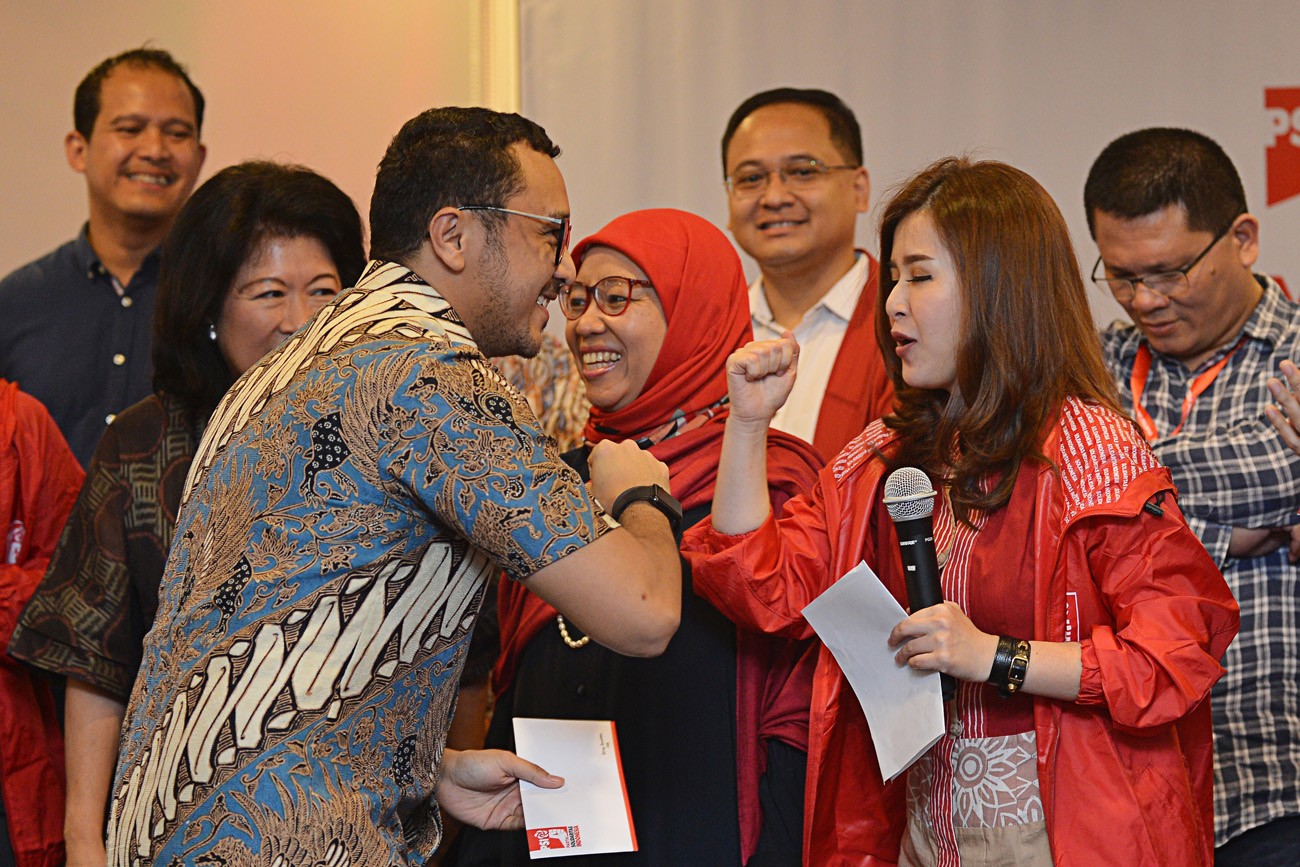Popular Reads
Top Results
Can't find what you're looking for?
View all search resultsPopular Reads
Top Results
Can't find what you're looking for?
View all search resultsPSI’s challenges in Jakarta
Many people expect the Indonesian Solidarity Party (PSI) of hip millennials to be an ice-breaker in the capital’s politics. Now this party has eight seats in the 106-seat Jakarta legislative council for the next five years. However, will PSI survive in Jakarta? Becoming an idealist party all the time outside parliament does not lead to the same results when actually sitting in the council arena.
Change text size
Gift Premium Articles
to Anyone
 In high spirits: Indonesian Solidarity Party (PSI) chairwoman Grace Natalie (right) and the party's politician Giring Ganesha, who is also the lead vocalist of popular pop band Nidji, after the announcement of PSI legislative candidates at the party's headquarters in Jakarta on Dec.17. (Antara/Wahyu Putro A.)
In high spirits: Indonesian Solidarity Party (PSI) chairwoman Grace Natalie (right) and the party's politician Giring Ganesha, who is also the lead vocalist of popular pop band Nidji, after the announcement of PSI legislative candidates at the party's headquarters in Jakarta on Dec.17. (Antara/Wahyu Putro A.)
M
any people expect the Indonesian Solidarity Party (PSI) of hip millennials to be an ice-breaker in the capital’s politics. Members of this political party have constantly challenged taboo issues in Indonesian discourse such as polygamy, minorities, and sharia-inspired bylaws. Some say this strategy may be risky for a newcomer party. But PSI successfully secured 5.7 percent or over 400,000 of more than 7.8 million Jakarta voters in the last general elections this year. Now this party has eight seats in the 106-seat Jakarta legislative council for the next five years. For a newcomer with the sixth most seats, even above the former ruling party Golkar which only got six seats, this is a big deal for the 2024 general elections. However, will PSI survive in Jakarta? Becoming an idealist party all the time outside parliament does not lead to the same results when actually sitting in the council arena.
Jakarta has scores of problems including environmental degradation and economic inequality. Despite efforts at regional spatial planning for the metropolitan, chronic issues are yet to be resolved, worsened by suspected conflicts of interest from the executive and legislative branch. The PSI must quickly grasp the real politics of Jakarta to be able to overcome them.
The first challenge for PSI is dealing with bigger political parties in the Jakarta legislative council. The parties of the Indonesian Democratic Party of Struggle (PDIP), Gerindra, the Prosperous Justice Party (PKS), and Democrat Party make up almost two-third of councillor seats. With their respective agendas, the big parties seek to maintain close cooperation with each other in government supervision or in the drafting and passing of Jakarta’s bylaws. As PSI became popular for its anti-mainstream views in the election campaign, inevitable collaboration with fellow councillors would be a challenge, particularly for its councillors. The eight councillors are the new kids on the block with diverse backgrounds. Their background such as lawyers, fresh graduates, and social volunteers may be relevant to reach out to the people. But the critical point is to what extent, they could gain mutual trust from fellow councillors.
The second related challenge is collegiality, at least on the surface, which is more preferred than individual performance. The PSI has a strong tendency to show off its independent and breakthrough stance. The PSI councillors must brace for resistance from fellow MPs if they continue to appear wilfully strong-headed in deliberations of policies. Conversely, PSI could gain popular appreciation with their out-of-the-box views for Jakarta’s problems; thus, the councillors should obviously have good diplomatic skills.
The third challenge is the patrimonial culture as the local council and also the national political stage dominated by older politicians who are well connected with leading figures of the capital, both in business or bureaucratic spheres. As a newcomer, PSI may still struggle in the first year. But the councillors would need to mold their own style as soon as possible if they do not want to be absorbed into this old political culture.
The fourth challenge is managing sensitive issues. The PSI has been well-known to challenge old parties and conservative groups face-to-face, which looked like a good marketing strategy in the campaign period to attract young middle-class voters. In the new Jakarta legislative council, I am not suggesting that PSI becomes a safe player; but at least they should have strategic timing, mainly when addressing the public.
The fifth challenge is whether the new PSI councillors, most of them becoming politicians for the first time in their lives, can behave as councillors instead of civil society activists in the next five years. Newcomers to the legislative bodies usually still perceive themselves as outsiders, criticizing virtually everyone. This is may be problematic and could unnecessarily harm relations with other councillors. PSI members should consistently represent their constituents and speak for the public. Their young councillors may be unexperienced but bring fresh energy into the political arena.
The political parties before PSI have failed to show consistency with their promises, thus eroding public trust. At the beginning, they were promising MPs with good ideas. In the end, they just became rubber stamp actors in policy making.
With eight elected MPs, PSI may be bullied on the council’s floor. Yet PSI could become Jakartans’ new hope for its daily problems, if this millennial party could influence Jakarta‘s political arena with no political scandals including corruption.
***
Researcher at Center for Politics, Indonesian Institute of Sciences (LIPI), studying for Masters in Political Science at the Australian National University, Canberra.










